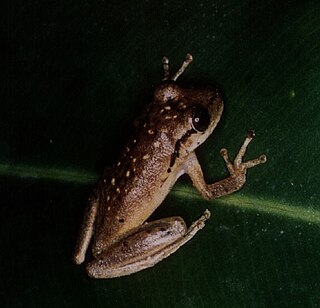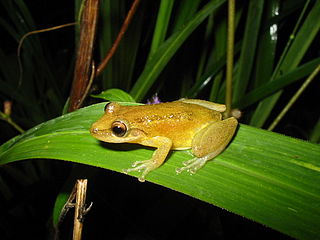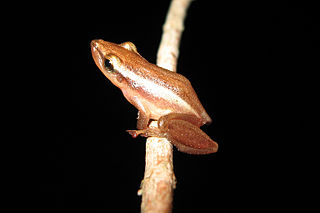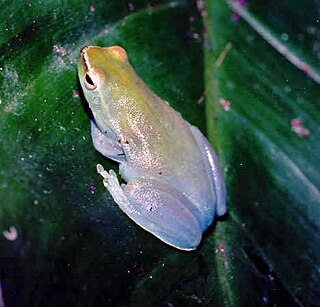
Dendropsophus leucophyllatus is a species of frog in the family Hylidae. It is found in the Amazon Basin.

Dendropsophus marmoratus is a species of frog in the family Hylidae. It is found in the Amazon rainforest and montane forests in the eastern piedmont, in Bolivia, Brazil, Colombia, Ecuador, French Guiana, Guyana, Peru, Suriname, and Venezuela. Its natural habitats are subtropical or tropical moist lowland forests, intermittent freshwater marshes, and heavily degraded former forest. "Marmoratus" in Latin means "marble," perhaps referring to the dorsal coloring pattern. It is threatened by habitat loss.

Dendropsophus microcephalus is a species of frog in the family Hylidae. It is found in southeastern Mexico, Central America, and northern South America in Colombia, Venezuela, Trinidad and Tobago, the Guianas, and northern Brazil. This widespread species might actually be a species complex. Its common names include yellow treefrog, small-headed treefrog, and yellow cricket treefrog.

Itapotihyla is a genus of frogs in the family Hylidae. It is monotypic, being represented by the single species Itapotihyla langsdorffii, commonly known as the ocellated treefrog. It is found in the Atlantic Forest biome of Brazil, with an isolated population in eastern Paraguay and adjacent Brazil and northeastern Argentina.

Scinax alter, the Crubixa snouted treefrog, is a species of frog in the family Hylidae endemic to Brazil.

Scinax boesemani is a species of frog in the family Hylidae. It is found in The Guianas, southern Venezuela (Amazonas), and northern Brazil. The specific name boesemani honors Marinus Boeseman, a Dutch ichthyologist. Common name Boeseman's snouted treefrog has been coined for it.

Scinax boulengeri is a species of frog in the family Hylidae. It is found in Colombia, Costa Rica, Nicaragua, Panama, and possibly Honduras. Its natural habitats are subtropical or tropical moist lowland forests, intermittent freshwater marshes, pastureland, plantations, rural gardens, and urban areas. It has been found as high as 600 meters above sea level.
Scinax danae is a species of frog in the family Hylidae. It is endemic to southeastern Venezuela and occurs in the La Escalera region of the Sierra de Lema, Bolívar state. The specific name danae honors Dana Trueb Duellman, the daughter William E. Duellman, the scientist who described this species. Despite this, common name Bolivar snouted treefrog has been coined for this species.

Scinax elaeochroa, commonly known as the Sipurio snouted treefrog, or olive snouted treefrog, is a species of frog in the family Hylidae. It is found in the Caribbean lowlands of Nicaragua and Panama and in the Pacific lowlands of Costa Rica and Panama, with an isolated population in Colombia.
Scinax exiguus is a species of frog in the family Hylidae. It is found in the Gran Sabana of Venezuela and in the Roraima state of the adjacent northern Brazil, as far south as Boa Vista, Roraima. Common name Gran Sabana snouted treefrog has been coined for it.

Scinax fuscomarginatus is a species of frog in the family Hylidae. It is found in northwestern Argentina, Paraguay, eastern Bolivia, southern, central, and eastern Brazil, and in scattered localities in the lowlands of eastern Venezuela and savannas of Guyana and southern Suriname as well as adjacent Brazil. As currently defined, it is one of the most widespread Neotropical frogs; the northernmost records refer to what was formerly recognized as Scinax trilineatus. Common name brown-bordered snouted treefrog has been coined for this species.

The blue-headed snouted tree frog or Spix's snouted tree frog is a species of frog in the family Hylidae. It is found in Bolivia, Brazil, French Guiana, Guyana, Suriname, and Venezuela. Its natural habitats are subtropical or tropical moist lowland forests, moist savanna, intermittent freshwater marshes, pastureland, rural gardens, and heavily degraded former forest. It is threatened by habitat loss.

Scinax rostratus is a species of frog in the family Hylidae. It is found in central Panama and eastward to Colombia, Venezuela, and coastal lowlands of Guyana, Suriname, and French Guiana. Common name Caracas snouted treefrog has been coined for this species.

Scinax ruber is a species of frog in the family Hylidae which is known in English as the red snouted treefrog or red-snouted treefrog, sometimes also Allen's snouted treefrog, the latter referring to the now-synonymized Scinax alleni. This widespread species is found in much of Amazonian and northern coastal South America and into Panama, as well as in some Caribbean islands as introduced populations. It is a complex containing several cryptic species.

Scinax squalirostris is a species of frog in the family Hylidae. It is found in southeastern, southern and central Brazil, Uruguay, northeastern Argentina, southern Paraguay, and Bolivia. The nominal species might actually represent more than one species. Common names striped snouted treefrog and long-snouted treefrog have been coined for it.

Sphaenorhynchus lacteus, the Orinoco lime treefrog or greater hatchet-faced treefrog, is a species of frog in the family Hylidae. It is a widely distributed species found in the Orinoco and Amazon basins in Venezuela, the Guianas, Colombia, Brazil, Ecuador, Peru, and Bolivia. It also occurs in Trinidad and Tobago.

Stefania evansi is a species of frog in the family Hemiphractidae. Stefania evansi is, along with other closely related frogs, known for its unusual reproductive mode where females carry the eggs and juveniles on their back. It is sometimes known under common names Groete Creek carrying frog, Groete Creek treefrog, or Evans' stefania. These names refer to its type locality, Groete Creek in the region Essequibo Islands-West Demerara, Guyana, where the holotype was collected by one Dr. R. Evans.
Stefania roraimae is a species of frog in the family Hemiphractidae. It is endemic to Guyana. Its type locality is Mount Roraima; it is also known from Mount Ayanganna and Mount Wokomung. It presumably occurs in the adjacent Venezuela and Brazil too.
Cornufer hedigeri, commonly known as the Treasury wrinkled ground frog or Solomon Islands giant treefrog, is a species of frog in the family Ceratobatrachidae, named after Henry B. Guppy who collected the holotype from the Treasury Islands. It is widespread in the Solomon Islands archipelago, though it is missing from New Georgia and Makira islands.
Scinax cretatus is a frog in the family Hylidae endemic to Brazil.

















